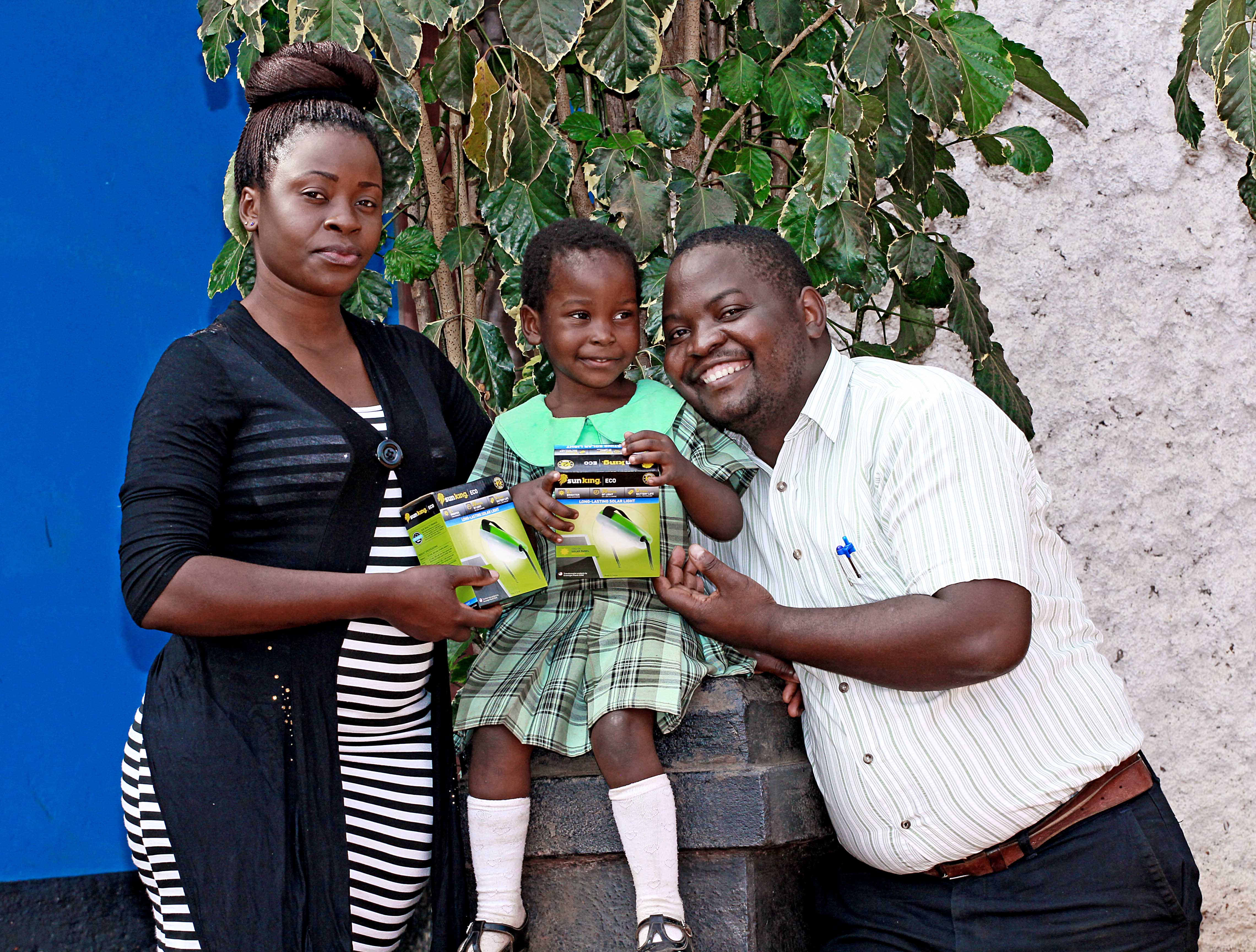
by Rebecca Wolfe
The soft fibers of the wick flicker, crumble, and flame, feeding off the kerosene that seeps into its weave. A fuzzy hum something like the noise of far off crickets fills the cinderblock home. A dim, orange light casts long shadows along the empty floor. A student takes his papers over to the small table and sits, squinting as he scratches out the solutions to the problem sets he was assigned. He coughs, blinks, and coughs again.
“Growing up in the village… raised by my great grandmother, kerosene lamps were the only affordable source of lighting.” These are the words of Francis Mbewe, a shop owner, clean energy advocate, and Zidisha borrower. Using kerosene lamps to study for his grade seven and grade nine exams, Francis wound up with a cough that forced him to miss school for two weeks. While Francis did face hardship throughout his education, he made it all the way through to university, where he began his journey as an entrepreneur. Struggling to find the funds to purchase his textbooks, he got creative. By taking on several part-time and weekend jobs Francis was able to gather enough capital to purchase a set of refurbished phones, which he resold to fellow students for a small profit. It was a successful venture. Francis was not only able to buy his textbooks but also to expand his business, developing the small sales production into the shop he owns and operates today. Francis’ business, Royal Towers Zambia offers a plethora of technologically oriented services, from music downloads to phone charging, software installation to printing. Francis says that he chose to enter into this technology based business because “there was no one providing these services under one roof.” He knew that he could bring it all together in one place, creating a one-stop-technology-shop for his community.
While Francis’ business was doing fairly well, he did not have the capital that he needed to expand his services and create more opportunities for his family – his “lovely and caring” wife of four years, Thelma, their three-year-old daughter Nadalisika, and their second child who is on the way. Francis was looking for opportunities to increase his capital, and that is how he came to find Zidisha. “I did not take it very seriously the first time because it was too good to be true,” he says, speaking of his first encounter with peer-to-peer lending via a Facebook post about a year ago. A while later, however, Francis was visiting a friend who told him about Zidisha and how it could be a good fit for his business. So, Francis decided to give it a shot.

Francis received his first Zidisha loan in March of 2016. His application, for a sum of $200, requested funding to purchase a toner printer, which would make large printing orders less expensive and more reliable. Zidisha lenders made this switch to a toner printer possible, increasing the shop’s printing profits by 60% in the first two months. In an update to his lenders Francis said that the increase in income helped him to better the nutrition of himself and his family, as well as pay his daughter’s school fees. It also enabled him to repay his loan and lay the groundwork for expanding his business into a new venture: providing solar lamps for those not connected to electricity.
This venture is Francis’ work of passion. Having spent many nights doing school work by the dim flame of a harmful kerosene lamp, he knew that wanted to help his community become free from the toxic light source. “Looking back,” he says, “I feel bad when I see any household in my village still using kerosene to light their homes or even to study. That’s why I launched my social business to distribute solar lamps to every household in my community. No student should be allowed to go through the challenges I went through! All students should have a chance to own a solar lamp and study for as many hours as they want.”
Following after this passion, Francis posted his second loan application in June of 2016. This loan, for a sum of $321, was to serve as the start-up capital for his goal of providing solar lamps to his entire community. “Energy poverty is pervasive in rural and slum communities of Chipata,” Francis said in his discussion page. “Over 70% of the population is not connected to electricity and still uses traditional sources of energy. Many rely on kerosene lamps for lighting. Each kerosene lamp releases a ton of carbon dioxide smoke every year, contributing to global warming and creating risks of burns, pneumonia, bronchitis, and lung cancer. The [kerosene] lamps are too dim for good reading and kerosene purchases eat up family income.” The average household, he said, spent $85 per year on kerosene for light and cooking. His business, Royal Towers Zambia, he said, was working toward a new goal of “distributing solar lamps to students and families so that we replace kerosene use with clean solar lamps that are affordable and lights 10x more than a kerosene lamp.” With solar lamps costing just $15, and coming with a one-year warranty, the replacement of kerosene with this product has the possibility of saving a family up to $70, “which they can use to improve their nutrition intake or invest in their children’s education.” One of Francis’ lenders praised his effort and Francis replied with thanks. “It’s a Social Business,” he said. “Helping people while making money to support my family.”
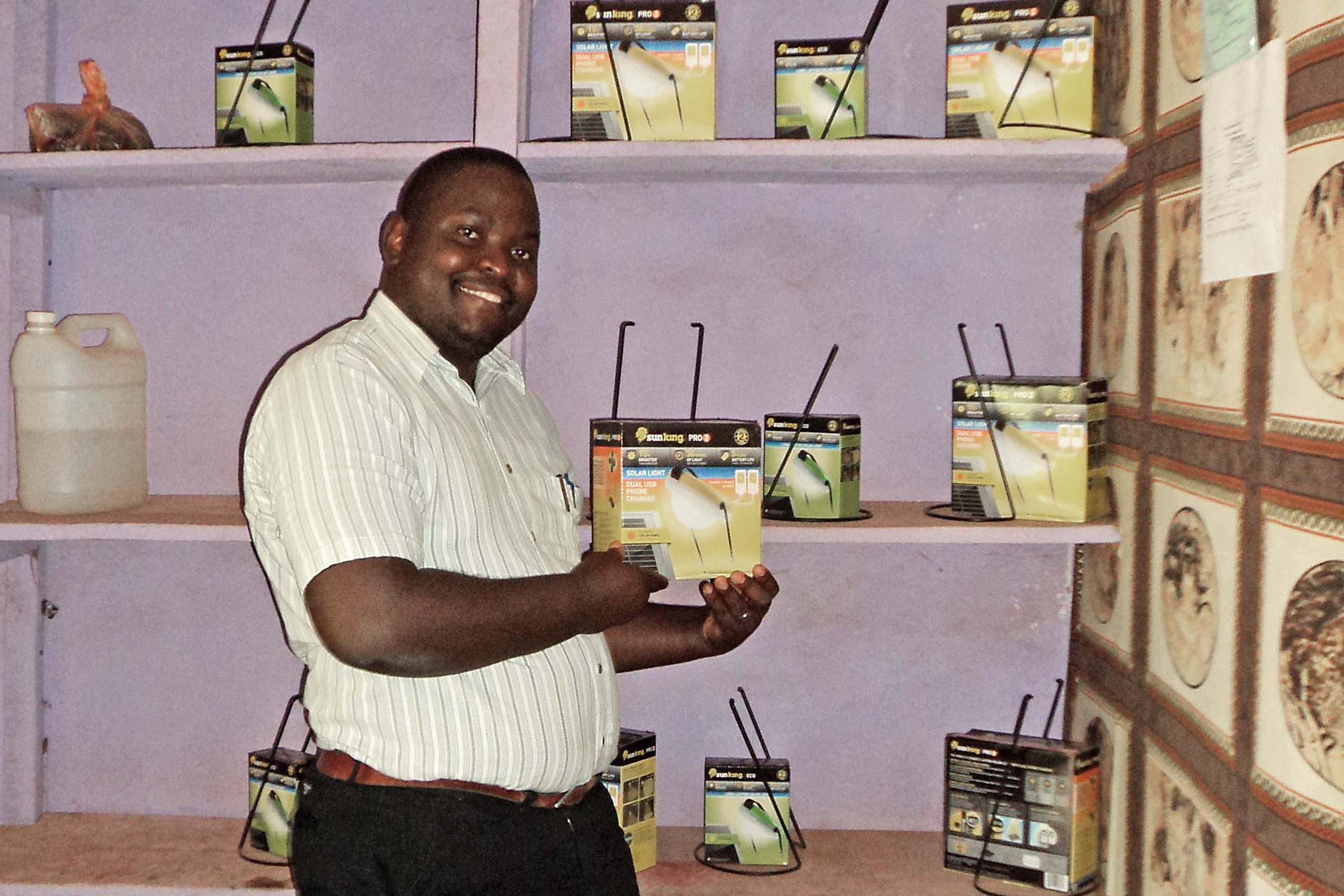
With his second loan fully funded Francis was able to purchase 30 solar lamps, which he distributed to students and families, “the most vulnerable people and communities who constantly continue using unreliable sources of energy for lighting and cooking.” Adding solar lamps to his business also increased Francis’ income by 60%, allowing him to raise his family’s standard of living as well as contribute to the greater health of his community. “Thank you so so very much for this great opportunity I have been given to grow my business from all of you my lenders.”
In mid-July Francis posted to his discussion page. “To all my lenders, I want you to meet Rachel Zulu, our very first client of the solar lamps we are selling.” Rachel, a young mother in Francis’ community, lives in a home without electricity. Her typical light sources were candles and kerosene, which were expensive and unreliable, affecting her daughters’ ability to study at home as well as her family’s health. Rachel’s purchase of a solar lamp, Francis said, would save her $310 over the course of 5 years. Another ten days after that, Francis introduced James Mwanza, another solar lamp client. A husband and father of 3, he and his family lived in a community without electricity and used kerosene as their main source of light. “Every year,” Francis said, “James spends $200 to light his house so that the children can study and also to light his small shop that brings income for the family.” The purchase of a solar lamp, Francis said, would save James’ family “over $1,000 in the next 5 years!” James had said that his children had “problems with the smoke that used to come from the kerosene lamps and their health was at risk.” With a solar lamp, this was no longer a risk. “James has no access to the internet,” Francis said, “And can’t access the loans here on Zidisha, but indirectly you are helping James save more and live a life that is worth living!”
In September, Francis shared the story of Doreen Bwalya, a “good friend and neighbor” to Rachel, his first solar customer. A mother of five, Doreen and her family live in an area of Chipata where “89% of the population still lives on less than $1.5 a day.” At night, Doreen had been lighting her home with candles. To ensure that the candles would last as long as possible, she and her family only lit them for a few minutes in order to prepare for bed. “This broke my heart,” Francis said, “because when I go home every day, I have electricity… it’s a privilege that sometimes I have taken for granted in the past.” Doreen saw a bright light coming from her neighbor Rachel’s house and went to ask her what it was. Rachel told her about the solar lamp, and the next day when Francis arrived to open his shop, Doreen was waiting there for him. After crunching the numbers, Doreen bought a lamp, delighted at the impact it would make for her children’s studies and her family’s ability to light their home.
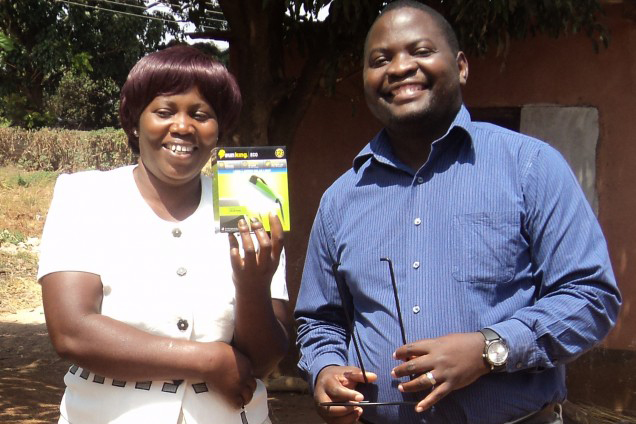
Francis is passionate about his business and the impact that it is making for people in his community. Excited by the possibilities of solar technology, he is working toward a clean energy future for his friends and neighbors. With the increase in profits from Royal Towers Zambia, Francis has been able to begin construction on a home for his family, which should be finished by June of 2017. This building, he says, “will be powered 100% by solar energy… every single day am working on moving from grid electricity to clean energy lighting.”
An astute businessman and passionate community member, Francis is making his community a safer, healthier, and more productive place. “Thank you again all my lenders,” Francis says at the end of his updates. “Always know that not only are you improving my life and that of my family, but you also impacting lives of many families in my community!”
Francis’ business is still going strong. With three sales people and a security guard now in his employ, Francis is seeing his dream grow. The Royal Towers Zambia team has a goal for 2017—to distribute 1000 lamps to the people of Chipata. “With Zidisha and all the lenders supporting our cause,” Francis says, “the goal is achievable!”
To keep up with Francis’ and his journey, follow him here. If you would like to make a life-changing difference in another community, invest in an entrepreneur over on our loans page.

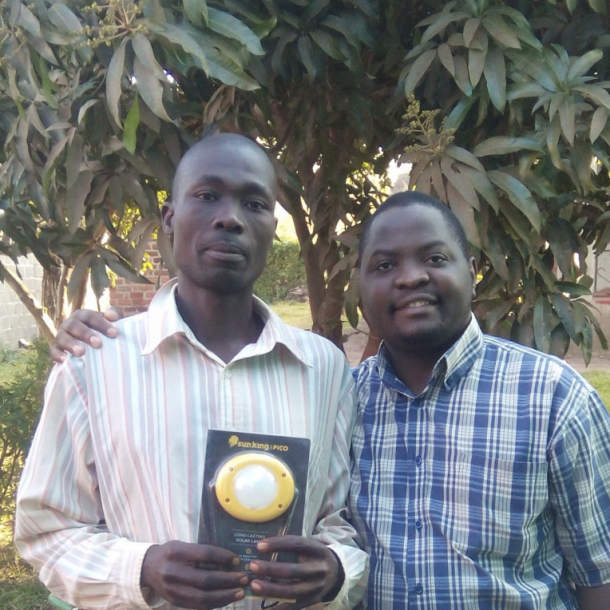

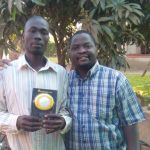
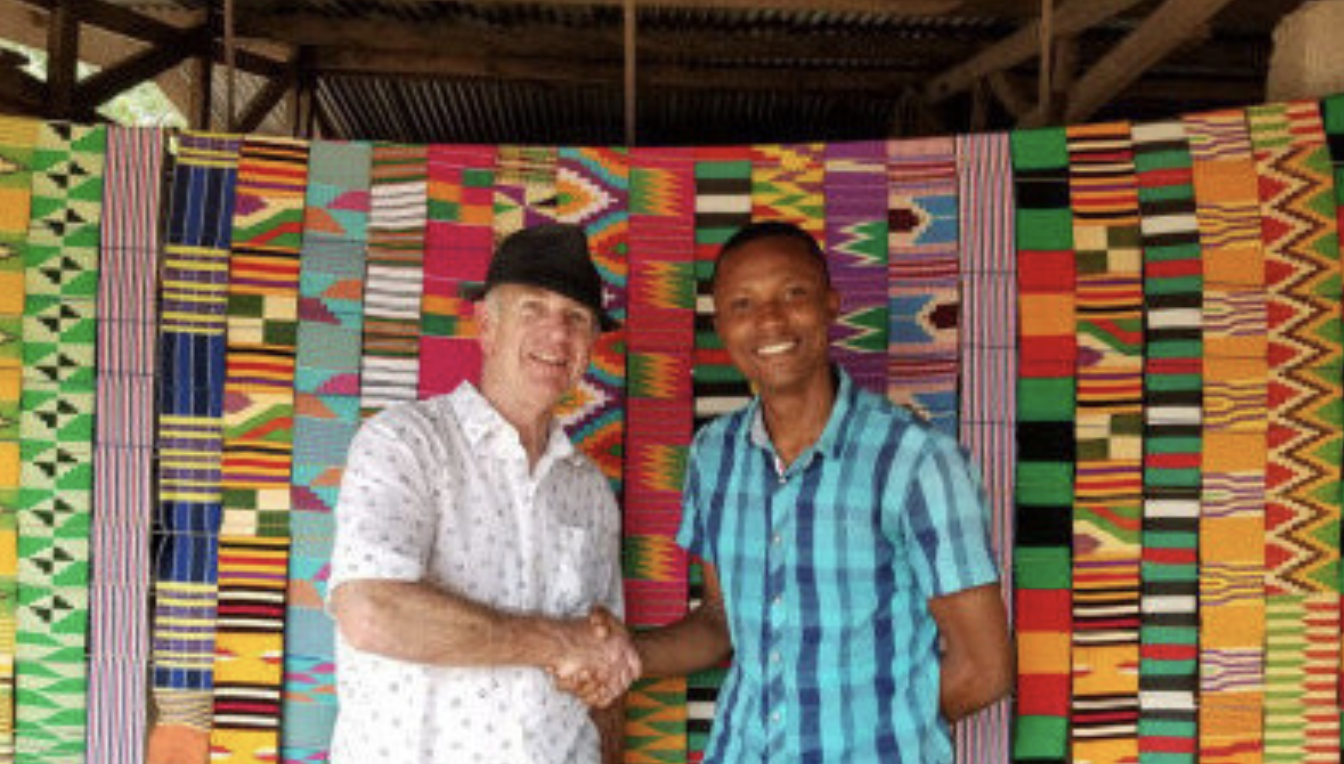
Great ,your are doing amazing business , keep up brother